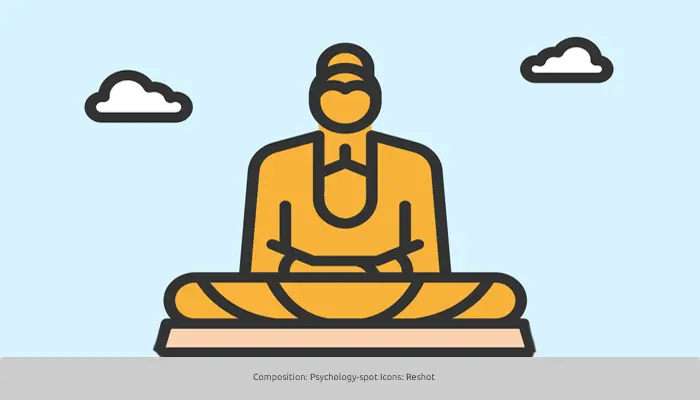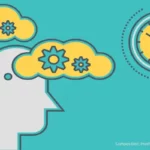
“One day, a disciple who was trying to reach the illumination went to his master and said to him, sadly,
– My meditation is horrible! I’m always distracted, I’m sick of my legs or I fall asleep. It’s awful!
– It will pass… -, was the teacher’s response, who smiled at him with the wisdom that gave him the experience.
The student left, but he kept insisting, so a month later he returned to the master and visibly enthusiastic made him part of the progress he made:
– I took your advice. Now my meditation is wonderful! I feel so aware, so calm and alive at the same time! It’s wonderful!
The teacher looked at him, he smiled again and said,
– It will pass… -.”
This simple but enlightening story reminds me of my grandmother’s comment that was perfect for both, the toughest moments and those where everything seems to go perfectly: “Everything comes and goes”. These words emphasize our tendency to think that situations and emotions are eternal, and encourage us to stand with our feet on the ground.
The balance of life that we refuse to accept
In Buddhist philosophy all phenomena and events have a positive and negative part. Even if speaking in terms of positive and negative, which depend greatly on individual perspectives because what may represent a loss to some can be a gain for others, it would be more correct to talk about opposite poles.
According to this way of understanding life and the world, to find balance, these poles alternate continuously. That is why we pass through bad times where everything seems to go bad and then come happy moments where everything flows naturally.
This balance is necessary because it allows us balance our vision of life. We can better appreciate the positive things that happen to us when we have gone through difficult times. At the same time, the negative events make us more resilient and help us mature emotionally. In fact, Ralph Waldo Emerson’s famous phrase: “Most of the shadows of this life are caused by our standing in our own sunshine”, not only indicates the duality that encapsulates every situation, but it also highlights our role in those lights and shadows.
How does the “durability bias” affect us?
In psychology there is a phenomenon called “affective forecasting”, which would be our ability to predict how we will feel if certain circumstances occur, the intensity of those emotions and the duration. Interestingly, we discovered that we are quite good at predicting whether we will feel good or bad, defrauded or excited, but we are bad at predicting the intensity of these emotions and their duration.
For example, we can expect that after the end of a relationship we will feel sad, but we usually exaggerate the intensity of this sadness and its duration. We tend to overestimate our emotional reactions, is what we know as “durability bias”.
In this regard, a number of studies have shown that:
– University students overestimate how happy or unhappy they will feel if they receive good or bad grades.
– People tend to overestimate how unhappy they will be two months after they broke a couple relationships.
– University professors overestimated how unhappy they would feel five years after they were denied access to a doctorate.
– Women overestimated how unhappy they would be receiving undesirable results in a pregnancy test.
– People underestimate their ability to adapt to a health problem or a disability.
All this tells us that we must learn to control this perception of the duration if we want to see life in a more balanced perspective. In fact, this attitude can have terrible consequences:
1. We sink more into the pit of despair. When we live a black period of time where the universe seems to conspire against us, if we think that there is no solution and we can’t get out of the situation, we end up developing a deep desperation. It is also likely that we develop the learned helplessness, we throw the sponge and get used to that state, so we will not even be able to seize the opportunity to change when they appear.
2. We do not enjoy the little things. When we go through a happy moment, and the stars seem to be aligned with ours, we often let ourselves get conditioned by the euphoria and we would like to start immediately a new project. In this way we can make risky decisions that undermine what we have achieved so far. “Looking for the best, we often spoil what is right,” said William Shakespeare.
How to take profit of every stage of life?
When things go wrong, have confidence that things will improve is crucial to maintain the emotional balance in the storm and avoid collapsing, it is important to continue to trust our psychological resources and our ability to deal with the problems. But this does not mean taking naive optimism, but just be aware that sooner or later everything will pass.
An excellent exercise to cultivate this prospect is to look into an event that has been a concern for us in the past for a long time, creating anxiety. How do we consider it after so many years? What lesson it left us?
Often we find that although this event was very negative, the teaching that left us is still a treasure today. We also find that many of the worries that made us suffer were useless and, above all, we realize that much of the pain we experienced has gradually disappeared. In fact, the main objective of this exercise is to understand that no matter what it happens everything will pass.
When everything is flowing, it is crucial to take advantage of this moment in order to store the positive energy. At this stage we can give great impetus to our projects, but without forgetting to live here and now. It is time to enjoy our results and feel satisfied, to be fully aware of the little details that enrich our lives.
An excellent exercise at this stage is to practice gratitude. Each day, before going to bed, we should mentally note, or in a diary of gratitude, at least three things we felt grateful for during the day. It can be absolutely anything, from the smile of a person who illuminated our day, a little success at work or a walk with our pet friend.
The interesting thing about this exercise is that every day we will be more and more aware of the small details of everyday life that we can feel grateful for, so we will learn to live with a mindfulness attitude without making any effort.
Sources:
Wilson, T. D. & Gilbert, D. T. (2013) The impact bias is alive and well. J Pers Soc Psychol; 105(5): 740-748.
Halpern, J. & Arnold, R. M. (2008) Affective Forecasting: An Unrecognized Challenge in Making Serious Health Decisions. J Gen Intern Med; 23(10): 1708–1712.
Wilson, T. D. & Gilbert, D. T. (2005) Affective Forecasting. Knowing What to Want. Current Directions in Psychological Science; 14(3).
Gilbert, D. T. & Elbert, J. E. (2002) Decisions and revisions: the affective forecasting of changeable outcomes. J Pers Soc Psychol; 82(4): 503-514.



